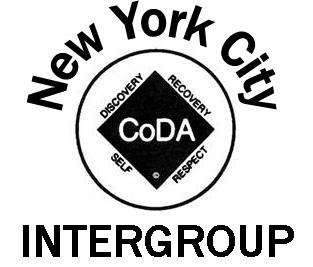 |
A Twelve Step self-help program for Co-Dependents |
| Click on a Step below to see the readings and exercises for that Step. Step 1 Step 2 Step 3 Step 4 Step 5 Step 6 Step 7 Step 8 Step 9 Step 10 Step 11 Step 12 |
CoDependents Anonymous (CoDA) in New York City This web site has been provided by NYC CoDA Intergroup Working the 12 Steps of CoDependents Anonymous (CoDA) © 2005 NYC CoDA Intergroup. All rights reserved. The CoDA 12 Steps and 12 Promises are © Co-Dependents Anonymous, Inc. The Twelve Steps and Twelve Traditions have been reprinted and adapted with permission of Alcoholics Anonymous World Services, Inc. Permission to reprint and adapt this material does not mean that AA has reviewed or approved the content of this publication, nor that AA agrees with the views expressed herein. AA is a program of recovery from alcoholism only – use of the Twelve Steps and Twelve Traditions in connection with programs and activities which are patterned after AA, but which address other problems, does not imply otherwise. Step 4 Co-Dependents Anonymous Step 4: “Made a searching and fearless moral inventory of ourselves.” Co-Dependents Anonymous Promise 4: “I release myself from worry, guilt, and regret about my past and present. I am aware enough not to repeat it.” Suggested Reading CoDA Blue Book pp. 39-47; (also p. 208). 12 Step Handbook: Step 4 Chapter, pages 19-22. “CoDA 12 Steps & 12 Traditions Workbook – Steps 4,5,6” : Step 4 is pages 9-15. Exercises The 4th Step can feel challenging. It may help to think of it in “mini-steps”: * Breaking the ice – looking at basic issues about the 4th Step * Choosing a format that works for you * Working the Step – in other words, writing it out, using whatever format you’ve chosen. Each of these areas is covered below, as well as some “issues to consider.” Breaking the Ice… 1. Without editing or over-analyzing, write about “what the 4th Step means to me.” 2. How does the 3rd Step help you work the 4th? Is there anything about the 4th Step that you’d like to “turn over” to God? 3. What are you fears about the 4th Step? Does it have to be perfect? 4. What do you hope to gain from working the 4th Step? Or what is “the point” of it? 5. Look at the general questions on page 12 of the Steps 4,5,6 Workbook. Use any that feel right. Choosing a Format for your 4th Step 1. What format will your 4th Step take? Review the formats in the Steps 4,5,6 Workbook, page 11. Also look at the suggested format in the CoDA Blue Book, pages 41-45. Which one or ones, if any, do you like? Consider trying out a format, like test driving a car. Then “sleep on it.” Turn it over to God. Eventually, choose a way that feels right to you. You can use one or more of the suggested formats, or you can combine or custom-make a format to suit you. After all, this is your 4th Step. 2. Talk to friends who have worked the 4th Step. Find out their method. Was it written out like a story or done in columns like a chart. Did they use a unique approach? Take what you like and leave the rest…. 3. If you’re feeling overwhelmed by all the possible formats, can you let go and let God? What will make this process feel safe for you? Are there time boundaries that will help? Perhaps you can take a leap of faith and just try one format for a while to see if you like it. After a week, evaluate it. How does it feel? Working the Step * Remember: although you want to be “searching and fearless” and thus not rush through the Step, that you are doing a 4th Step, not the 4th Step. “Progress, not perfection.” “Keep it simple.” * As you work your 4th Step, keep the task manageable; set safe boundaries for yourself. For example, you may say to yourself, “I will write for 30 minutes tonight.” Set a timer and let yourself stop when it goes off. Consider “book-ending” your Step work. Book-ending means telling someone, or your meeting, that you plan to do something, then telling them afterwards that you did it. It can help you show up for yourself. * For added depth, you may want to review the questions in the Steps 4,5,6 Workbook on pages 13-14, answering any that speak to you. * Finally, be gentle, and remember that sharing and reading about a Step is also part of working the Steps. Issues to consider… 1. Does perfectionism or procrastination belong on your inventory? (What will happen if you don’t do your 4th Step perfectly?) 2. Are you keeping this inventory about you, rather than taking others’ inventory? What is your part in the events of your life? 3. What people are included in your inventory? Have you included yourself? (How have you treated yourself throughout your life?) Have you included God? Who do you want to include? Do you want to include everyone, or can you focus on the main players in your life? What are your boundaries here? 4. What are your positive attributes? Have you included those in your inventory? Can you give yourself praise for the work you are doing at this very moment? Can you include that on your inventory? If you want to be on our email list to receive updates on upcoming CoDA events in New York City, please write to anicko2794@yahoo.com For more CoDA info, go to www.codependentsnyc.org or call 646-289-9954 For more information on the program of CoDependents Anonymous, visit the CoDA World Fellowship web site at www.coda.org |